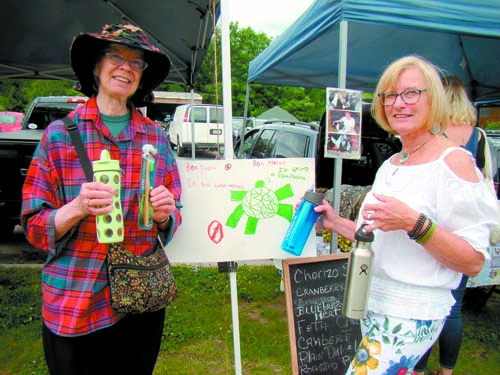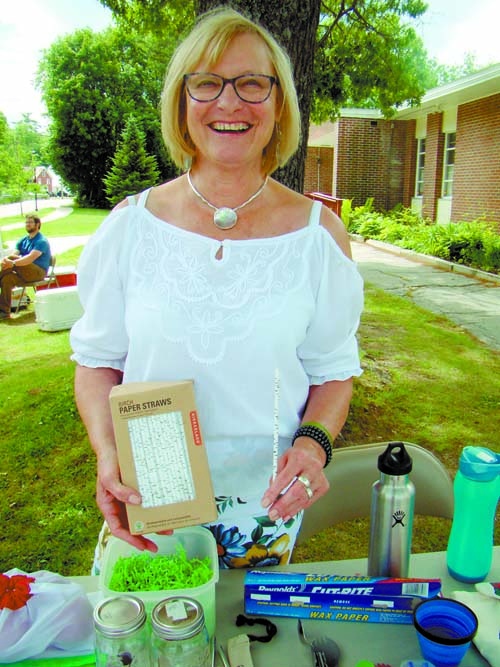Plastic awareness: Residents hand out ideas to reduce use

By Dawn De Busk
Staff Writer
When Ursula Flaherty took a trip to Kinvara, Ireland, she realized just how big and ugly the plastic problem has become.
“We had been on the beach in Ireland. There was plastic and trash on the same beaches that I had seen before when they were pristine,” she said.
The sight was absolutely shocking, she said.
Groups of people were working together to pick up the plastic that was strewn across the beaches with each tide.
“This is a world problem. It is urgent,” she said.
In fact, eight million metric tons of plastic end up in the ocean each year, according to plastic-pollution.org
“Plastic is found on every beach in the world, even in remote places and the Arctic,” Flaherty said.
According to a study from Plymouth University, “plastic pollution affects at least 700 marine species, while some estimates suggest that at least 100 million marine mammals are killed each year from plastic pollution.”
This is some of the information that Flaherty shares with others to make the point that it is a worthwhile endeavor to reduce plastic consumption.
Flaherty has in recent weeks set up an informational booth at the Bridgton Farmers Market.
Although the table displays an array of products that can be used instead of plastic, nothing is for sale.
Instead, Flaherty and another Bridgton resident, Sally Chappell, are trying to raise awareness, to start the conversation about reducing plastic in day-to-day life.
“I was inspired to do this after going to Ireland,” she said.
“What we are focusing on is eliminating single-use plastic bags,” she said.
“Recycling is not the answer. It is an illusion. The landfills are full of recycled plastic,” she said. “We need to focus on not using the plastic in the first place.”
She acknowledged that she was aware of the new law that will eliminate all single-use plastic bags in the state of Maine. That law kicks in on Earth Day 2020.
Flaherty said now is a good time to start. It might seem overwhelming — all the plastic that one person, one household uses, she said. But, it can be taken in small steps, she said.
“Our individual daily choices have a profound impact on our planet and its oceans,” she said.
“We, as people, can do our part to decrease single-use plastic waste. We can pledge to buy zero disposable plastic bottles, choose sustainable alternatives [instead of] single-use plastics whenever possible and encourage brands to make packaging a deciding criterion when we shop,” she said.
“Let your supermarket know you want them to stop using plastic in the produce department for example,” she said.
As people stopped by the table during the Farmers Market, Flaherty asked people to tell the management of the grocery stores where they shopped to stop using plastic bags for produce and meats. (Those weren’t eliminated as part of the Maine plastic ban law.)
“Plastic does not biodegrade. When it breaks down, small plastic particles remain. Unless we take drastic action, the amount of plastic littering the world will triple within a decade,” she said.
In addition to polluting the environment, plastic pollutes the human body.
“Plastic bottles can contain harmful chemicals to humans as well as a negative impact on the environment,” she said.
Flaherty said she does not know which direction the information booth will take but it has prompted some great conversations with the public. Most people are trying their best to reduce plastic in the lives, she said.
“The important thing is to bring it to the forefront and make it doable,” she said. “Most people want to do the right thing.”


